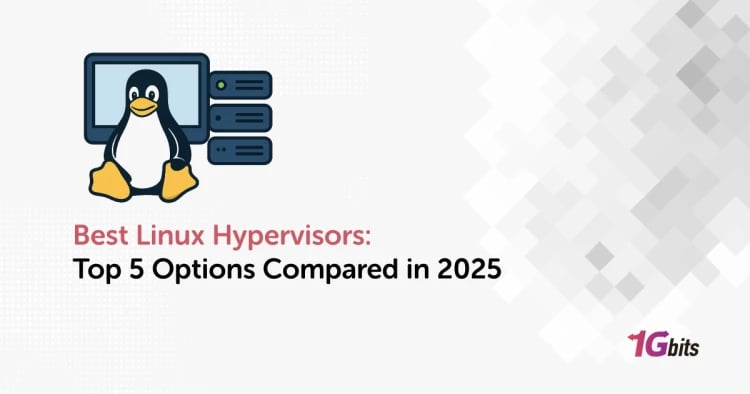What is Ubuntu? Ubuntu is an operating system just like our Windows and Mac OS but more advanced and designed to handle difficult tasks. Ubuntu is free and can be used for both personal and professional needs. Ubuntu was made with one motive in mind, and that was to create and distribute applications freely.
With Ubuntu, you can create and customize your own applications by running some codes. And you can distribute them to other operating systems without running a risk of data loss or disabling any applications. Among many Linux-based operating systems, Ubuntu is one of them, and it can be used in computers, network servers, and even smartphones.
Linux Ubuntu was developed by Canonical Ltd, a company based in England, and they made the platform open-sourced. Let’s dig a little deeper into the Ubuntu operating system and learn how it benefits its users.
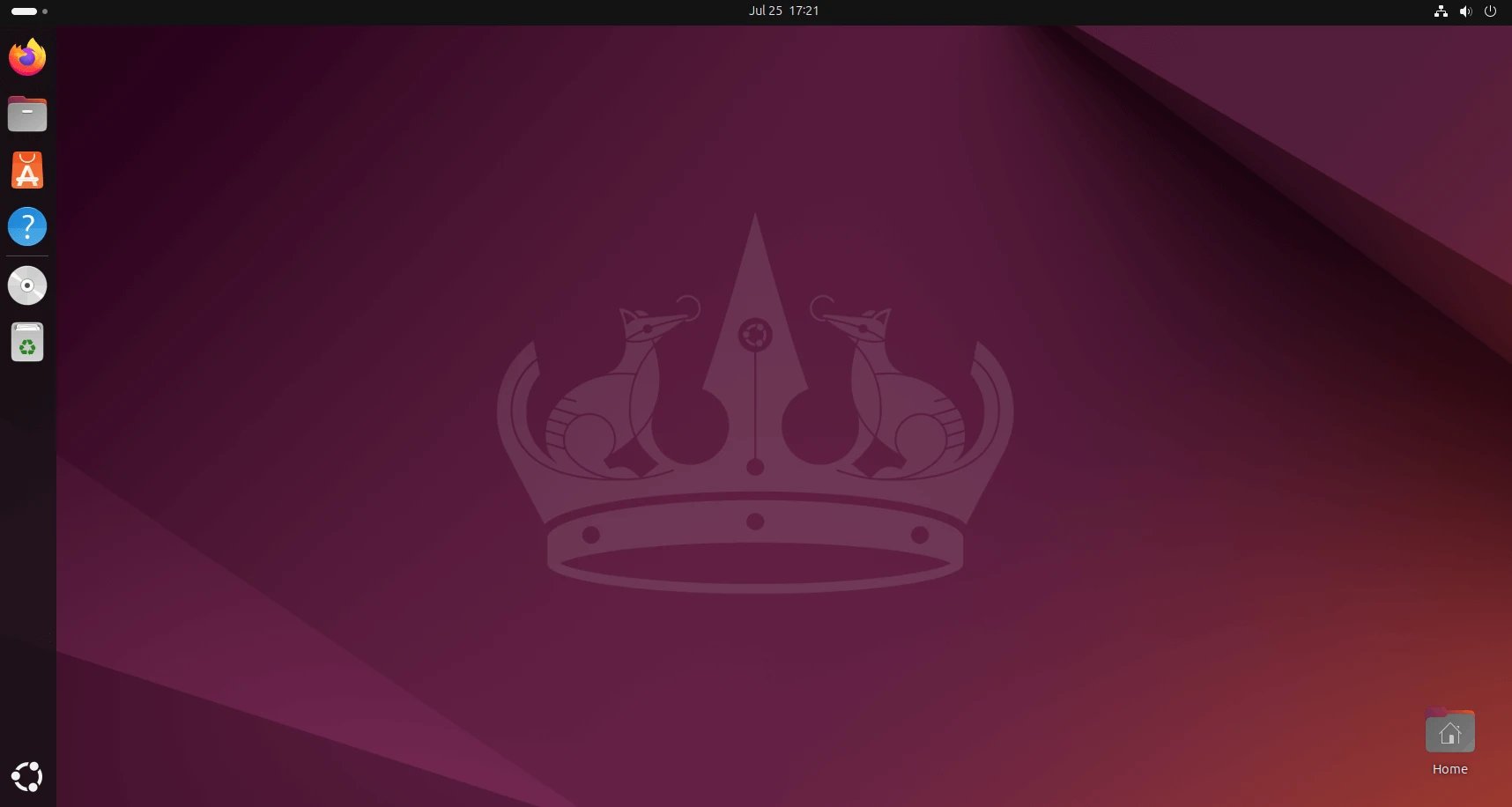
To enhance your remote desktop experience on Ubuntu, check out our guide on the best RDP clients for Ubuntu, which offers a selection of tools for seamless access and control.
What is the History of Ubuntu?
Debian was a previous Linux operating system, and Ubuntu was created from that only and got released in 2004. Debian used to work in 1993 and has gone through many changes and advanced modifications over the decades. But when Debian first got released, some people pointed out that Debian was not easy to install and maintain. And it also lacked frequent updates that should only improve the operating system.
But in 2004, Mark Shuttleworth decided to improve the Debian operating system by opening the Canonical company. Mark Shuttleworth is a South African entrepreneur who also sold a security company the same year Ubuntu was released.
For users looking to get started with database management on Ubuntu, check out our guide on installing MariaDB on Ubuntu for a step-by-step walkthrough.
|
Feature |
Ubuntu |
Debian |
|
Release Year |
2004 |
1993 |
|
Base System |
Based on Debian |
Independent |
|
Update Frequency |
Every 6 months |
Irregular |
|
User-Friendliness |
High |
Moderate |
|
Default Desktop |
GNOME |
GNOME (default), others optional |
|
Target Audience |
Beginners to Intermediate |
Advanced Users |
|
Commercial Support |
Provided by Canonical |
Community-driven |
|
Package Management |
APT with PPAs |
APT |
Ubuntu 4.10 was released in 2004, and the company decided that it would release Ubuntu updates every six months from the last month of releasing an update. And every update has eighteen-month support. Ubuntu was distributed among users free of cost through the CD or has been emailed for free.
In 2005, Shuttleworth created another company named Ubuntu Foundation to create future operating system developments. And after four more years, Ubuntu was advanced to help open-source cloud management platforms like Amazon Elastic compute clouds for advanced web applications development.
Ubuntu has some popular distributions that help users from many parts of the world to create web applications and manage them seamlessly.

To ensure compatibility and access the latest features, it’s essential to know which version of Ubuntu you’re using. Follow this guide on how to check your Ubuntu version to stay up-to-date and make the most of your system.
What are the Popular Ubuntu Distributions?
Ubuntu helps make a wide range of distributions for a new and unique desktop environment. Let’s take a look at the popular operating systems that are based on the Ubuntu OS.
Linux Mint
- Linux Mint is a very intuitive desktop operating system that does not operate on much memory space.
- You can customize Linux Mint and set up various widgets or themes from its settings.
- Updating, backing up data, restoring updates or data, and fixing glitches are all done with just a simple click.
- It comes with a Timeshift feature that makes restoring and maintaining the operating system easy.
- You can turn on the automatic update from its Preference menu.
- You can perform troubleshooting on your own with the help of some guides available on the distro.
LXDE OS
- LXDE OS allows you to renovate your old desktop so that it works like new again.
- Comes with a simple and user-friendly, lightweight desktop interface.
- It provides all the important functions an operating system should have.
- Simple to configure.
- OS available for 32 and 64 bit
- Comes with many software programmes preinstalled.
- Various wallpapers and customization options are available.
Zorin OS
- Zorin is a secure Ubuntu-based distro that respects your privacy
- It’s safe, fast, and powerful
- It is simple to maintain for work and security
- Provides you with all the professional and organizational functions to make your workspace better
- You can access Zorin remotely and access other devices from it
- It encrypts the communication between the server and your computer automatically.
Elementary OS
- Elementary OS is perfect for beginner users who have never used Ubuntu before
- It offers a simple and user-friendly interface.
- It kind of looks like the Mac OS desktop environment
- A wide range of apps come pre-installed
- Updates regularly
- Various available packages on the repositories
Pop OS
- Pop OS is for relatively advanced users and professionals who know how to use Ubuntu to their advantage.
- It is an open-sourced platform, reliable, and secure
- It encrypts your installation and offers you preinstalled full-disk encryption.
- You will receive a private encryption key with the computer
- Fast navigation and comes with the auto-tilting feature
All these Ubuntu distributions come with their own advantages. But all Ubuntu operating systems have common advantages to provide users.
What Are the Advantages of the Ubuntu Operating System?
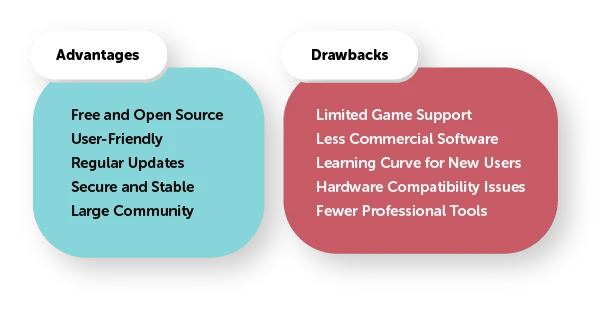
Let’s have a look at the reasons why Ubuntu is so popular:
Open-sourced
Ubuntu’s source code is open-sourced, which means you can customize and use the OS freely. Depending on your requirements and wishes, you can tweak its codes to make the OS suitable for your personal preferences.
Free
Ubuntu OS is free of cost, and you can easily download and install it. This is a big advantage for the users because it can benefit both organizations and individuals simultaneously. Maintaining your system costs a lot of budgets but not in the case of Ubuntu software.
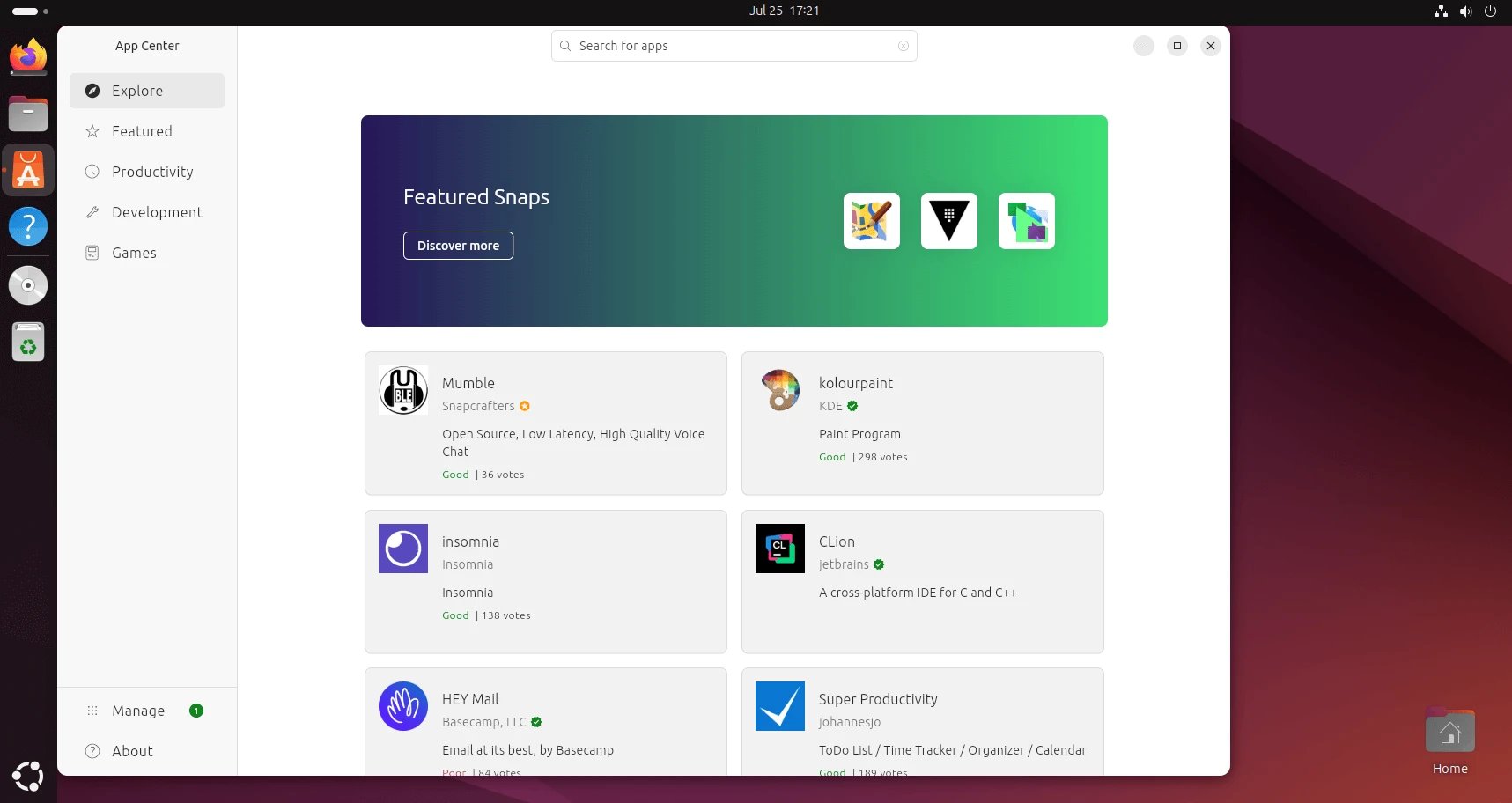
Secure and Privacy Protected
Ubuntu is the most secure system ever because you can change its code to make it more secure. You can grant or disable the permissions for apps to limit what they can do on your computer. Additionally, it comes with an in-built firewall to keep away threats. Its regular updates ensure that your operating system is running up to date.
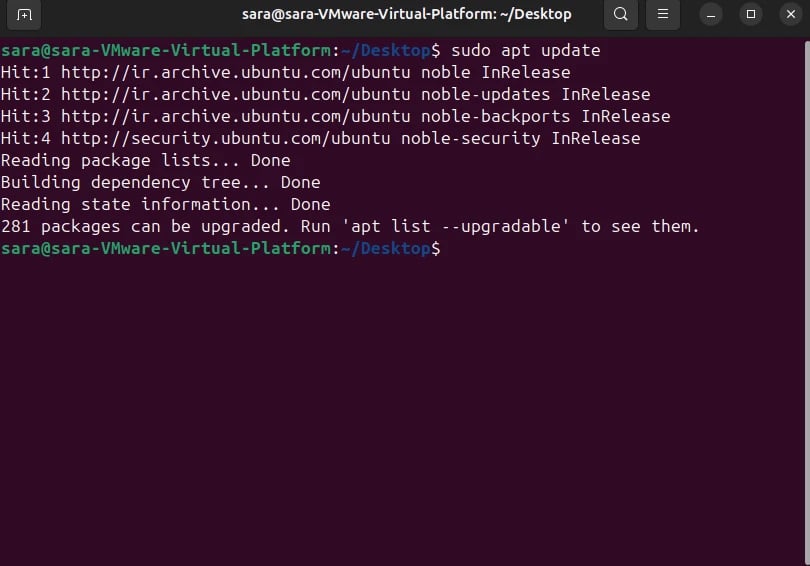
Guaranteed Support
Canonical and the Ubuntu community are supporting Ubuntu continuously and will do in the future. The company and the community work together to produce new updates to add new features to keep Ubuntu live, fix bugs, make it more efficient, and more.
It Meets All Your Needs
Ubuntu supports all your needs, no matter if you are a beginner user or an advanced one. Moreover, it comes with preinstalled applications such as LibreOffice, Firefox, VLC, etc., for the users.
100% Customizable
You can change almost everything about Ubuntu with a little tweak of its codes and make it suitable for your own usage.
Cross-Platform OS
Ubuntu distribution is available for set up on emulated environments or virtual environments, and you can do it with a VM or containers. You can use Ubuntu for network servers, cloud servers, robots, and many other devices, including Windows and Mac.
Works as a Great Training Tool
An open-sourced Ubuntu distro is perfect for training and development. If you are starting your journey as a software developer, website developer, or equivalent, it’s the first thing to start with.
Even with all these advantages, Ubuntu Linux comes with some downsides too. But the advantages always outweigh the disadvantages.
What Are the Disadvantages of Ubuntu?
Now, let’s have a look at the problems you might be facing while using a Ubuntu distro:
Takes Heavy System Resources
Even though Ubuntu can manage system resources efficiently compared to other operating systems, it takes more CPU resources to perform properly. It even takes more resources than Lubuntu and Xubuntu.
It does not Provide an Excellent Gaming experience
Ubuntu has advanced throughout the years, and even though you can’t play all the AAA titles right now, you can start sooner or later with Ubuntu. You can play games from Stream or PlayOnLinux to enjoy high-quality gaming on Ubuntu.
For those looking to expand their development toolkit on Ubuntu, learning how to install Yarn can be a valuable step. Yarn is a popular package manager that can help streamline your project management on Ubuntu.
Conclusion
So what is Ubuntu? Ubuntu is a versatile operating system that can be found on a variety of devices including web servers, email servers for programming, virtualization platforms, DNS servers, IoT devices, file servers, NAS, TV OS, and many other devices. The primary version of Ubuntu is GNOME (GNU Network Object Model Environment), which provides a combination of a user-friendly GUI and a set of applications that simplify the use of Ubuntu operating systems.
For those looking to manage databases on Ubuntu, check out our guide on How to Install phpMyAdmin on Ubuntu, a popular tool that enhances database management through an intuitive interface.
Apart from the regular Ubuntu distributions, there are several specialized editions available, such as Edubuntu for educational purposes, Kubuntu with the KDE Plasma desktop, Lubuntu with the LXQt desktop, Ubuntu Server Edition for server environments, JeOS (Just Enough Operating System) for virtual appliances, and Xubuntu with the Xfce desktop. These versions cater to different types of users and use cases.
If you’re managing an Ubuntu VPS or an Ubuntu RDP server, understanding these various distributions and their specific features can be crucial for optimizing your setup. For more detailed information about Ubuntu and its different editions, be sure to check out our other articles.
People also read:
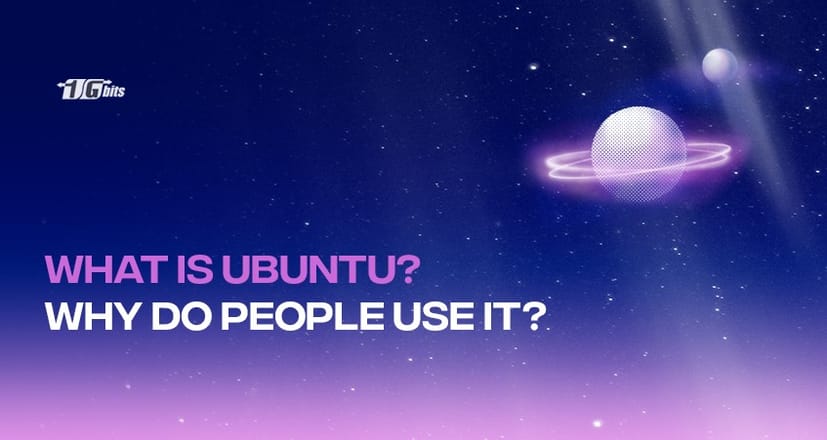




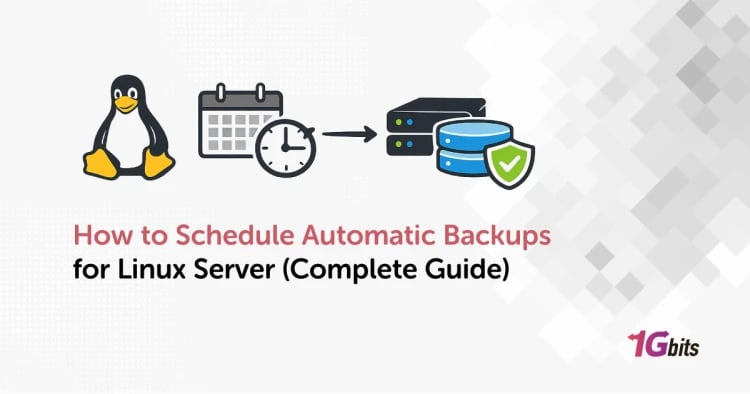
![What Is Cold Data Storage? ❄️ [2026 Guide] What Is Cold Data Storage? ❄️ [2026 Guide]](https://1gbits.com/cdn-cgi/image//https://s3.1gbits.com/blog/2026/02/what-is-cold-data-storage-750xAuto.webp)

